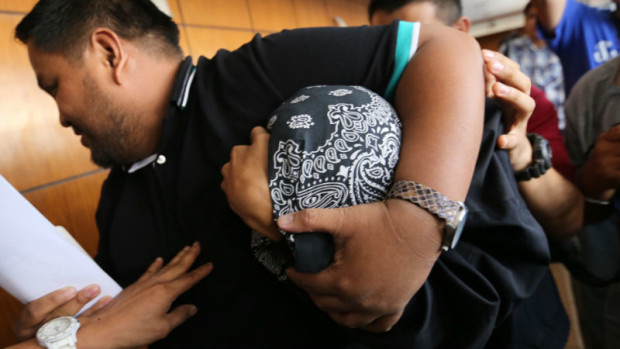
The suspect in the hacking of the Comelec website is carried away by NBI agents at the NBI Office, Manila. INQUIRER PHOTO/RAFFY LERMA
Paul Biteng, the 23-year-old who allegedly hacked the Commission on Elections (Comelec) website last month, was anything but contrite when agents of the National Bureau of Investigation arrested him in Manila on Wednesday night.
When presented to NBI Director Virgilio Mendez, Biteng—tagged as a member of the hacking group Anonymous Philippines—had an unusual request.
“He even took a selfie with me. He asked me, ‘Sir, can I have my picture taken with you?’” Mendez said, shaking his head as he recalled his meeting with the suspect, who faces charges for violating the anti-cybercrime law.
The bureau said Biteng, a recent information technology graduate, was known as PhantomHacker Khalifa in the hackers community which considered him one of the best, a “master.”
Almost a month after the hacking of the Comelec website on Easter Sunday, members of the NBI Cybercrimes Division led by their chief, Ronald Aguto, arrested Biteng at his Balic-Balic, Sampaloc, residence.
“He said he had no intention to harm,” Aguto said. “We got the computer he used so our forensic examination on the extent of the breach is ongoing.”
Website features disrupted
For Comelec Chair Andres Bautista, the suspect’s arrest should serve as a warning to other hackers. “You will pay for your crime,” he said.
Bautista noted that the features of the poll body’s website, like the one that allows voters to look for their designated polling precincts, had been disrupted due to hacking incident.
But he assured the public that this would not affect the conduct of the May 9 elections.
Mendez told reporters that the NBI remained hopeful that Biteng’s fellow hackers would fall next, adding that two had already been identified.
‘For practice’
According Francis Señora, the NBI agent on the case, Biteng had been hacking websites for years “for practice.” Among the 25 government websites he was able to hack were that of Pagasa, the Civil Service Commission, and the Dipolog city government.
His popularity, however, also became his downfall, Señora said. “He left so many traces that helped us identify him.”
The most incriminating was a hacking instruction video Biteng had uploaded on YouTube. In the video, he unknowingly exposed his identity when he clicked his computer’s “start” button, showing his full name.
NBI Cybercrimes Division executive officer Vic Lorenzo said Biteng successfully hacked the Comelec’s website on March 20 and found its vulnerabilities.
He started bragging about his feat seven days later to other hackers online, enabling them to penetrate the website and download some of the information found there, including the database of registered voters.
READ: Comelec apologizes to public as new website leaks voters’ data
Like Bautista, Señora assured the public that the hacking would have no effect on the results of the elections, saying Biteng penetrated the Comelec website not for money but for “bragging rights.”
Mendez said that based on their investigation, the suspect was not affiliated with any candidate or political party. “[There was] no indication that he made money and the computer he used was old.” With a report from AFP

